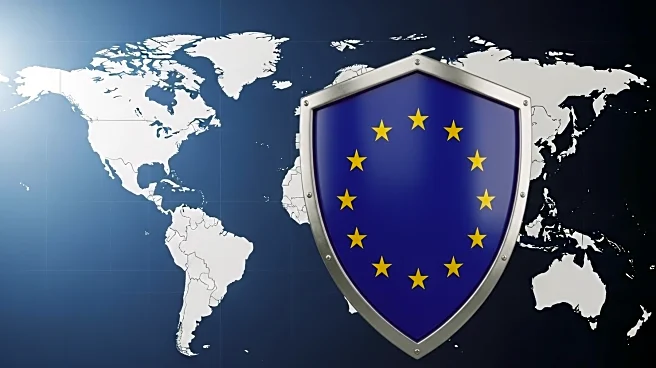What's Happening?
European Commission President Ursula von der Leyen has alerted EU lawmakers to the ongoing 'hybrid warfare' being waged against Europe, which she describes as a concerted campaign to destabilize the bloc. Recent incidents include airspace violations by Russian MiG fighters in Estonia and drone flights over critical sites in Belgium, Poland, Romania, Denmark, and Germany. These actions have led to grounded flights and scrambled jets as countermeasures. Von der Leyen emphasized that these are not isolated events but part of a broader pattern of threats, including cyberattacks on infrastructure and election interference. While not all incidents are directly attributed to Moscow, von der Leyen noted Russia's intent to sow division within Europe.
Why It's Important?
The significance of these developments lies in the potential impact on European security and political stability. Hybrid warfare, which combines conventional military tactics with irregular methods, poses a unique challenge as it operates in a realm of deniability, making it difficult to attribute actions directly to Russia. This strategy can undermine trust in public institutions and disrupt critical infrastructure, affecting the daily lives of citizens and the functioning of governments. The European Union's response to these threats will be crucial in maintaining regional security and cohesion, especially as Russia's activities have intensified since its invasion of Ukraine.
What's Next?
European officials are preparing to bolster regional security and defenses against these threats. NATO members have pledged to increase defense spending, and discussions are underway for initiatives like the Eastern Flank Watch, which proposes a 'drone wall' network to protect against airspace violations. However, there is some debate over the feasibility of such projects, with differing opinions among member states. The EU's ability to unify and implement effective countermeasures will be critical in addressing the ongoing security challenges posed by Russia.
Beyond the Headlines
The ethical and legal dimensions of hybrid warfare are complex, as these tactics blur the lines between war and peace, complicating international responses. The long-term implications could include shifts in defense strategies and increased militarization of borders, potentially affecting diplomatic relations and international law. The EU's approach to these challenges may set precedents for how nations address unconventional threats in the future.









